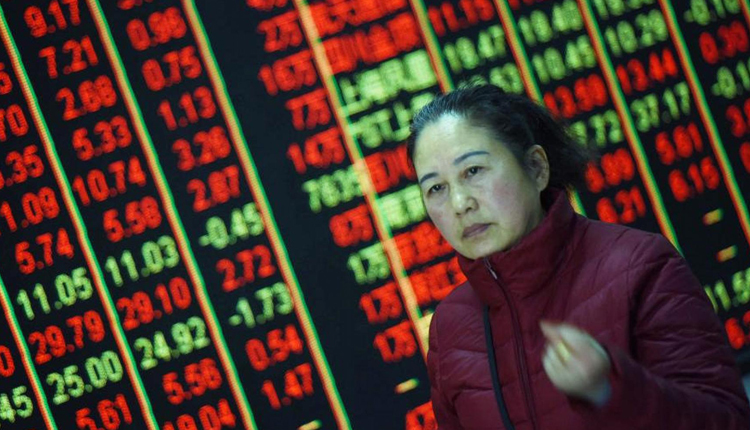Asian markets mostly advanced on the first trading day of November amid renewed concerns over the potential for a long-term trade deal between China and the U.S.
Mainland Chinese stocks rose by the close The Shanghai composite advanced 0.99 percent to about 2,958.20 and the Shenzhen component gained 1.73 percent to 9,802.33. The Shenzhen composite also added 1.288 percent to approximately 1,637.00.
A private survey of factory activity in China showed manufacturing activity in the country expanded more than expected in October.
The Caixin/Markit Purchasing Managers’s Index (PMI) for the manufacturing sector came in at 51.7, above expectations of 51.0 by analysts in a Reuters poll. The 50 level in PMI readings separates expansion from contraction.
A day before, official data showed manufacturing activity in China shrank for the sixth straight month in October. The official PMI survey typically polls a large proportion of big businesses and state-owned enterprises. The Caixin indicator features a bigger mix of small- and medium-sized companies.
In Hong Kong the Hang Seng index rose 0.57 percent, as of its final hour of trading, as shares of ESR Cayman jumped in the company’s public debut on Friday. The shares had surged 7 percent in the morning.
Meanwhile, South Korea’s Kospi advanced 0.8 percent to close at 2,100.20. The S&P/ASX 200 in Australia recovered from an earlier slip finish its trading day fractionally higher at 6,669.10.
Japan’s Nikkei 225 lagged as it slipped 0.33 percent to close at 22,850.77, while the Topix index ended the trading day largely flat at 1,666.50. Shares of gaming firm Nintendo surged 7.46 percent, after the company announced on Thursday a second-quarter profit that exceeded expectations.
Overall, the MSCI Asia ex-Japan index was 0.41 percent higher.
US-China trade fears
Investors watched for developments in U.S.-China trade amid renewed jitters after Bloomberg News reported Thursday, citing sources, that Chinese officials have been casting doubt over the possibility of a long-term trade deal with the U.S.
The report added Chinese officials are concerned about U.S. President Donald Trump’s “impulsive nature” and the risk of him backing out of any kind of deal.
That development came amid recent optimism for a “phase one” deal to be signed between the two economic powerhouses soon. The deal had been initially been expected to be signed at a November summit in Chile, an event which has since been canceled by the country due to ongoing anti-government protests.
For his part, U.S. President Donald Trump said Thursday a new location for signing the phase one trade deal with China will be announced soon.
Beijing and Washington have been engaged in a trade war since 2018, with tariffs having been slapped on billions of dollars worth of each other’s goods.
“Both sides (US and China) are keen to sign a deal, but doubt overshadows,” Vishnu Varathan, head of economics and strategy at Mizuho Bank, wrote in a note.
“To be sure, a limited (low-hanging) ‘phase one’ deal (which circumvents thorniest of issues such as China’s industrial, IP and technology transfer) is within grasp,” Varathan said. “But that does not quell doubts about meaningful progress beyond.”
Overnight on Wall Street, trade jitters sent shares on Wall Street lower. The Dow Jones Industrial Average closed 140.46 points lower at 27,046.23 while the S&P 500 slid 0.3 percent to end its trading day at 3,037.56. The Nasdaq Composite fell 0.1 percent to close at 8,292.36.
The October jobs report for the U.S. is set to be out Friday stateside, and expected to be unusually weak due to the strike at General Motors. Economists expect that just 75,000 jobs were created in October, and the unemployment rate is expected to tick up slightly to 3.6 percent from 3.5 percent, according to Dow Jones.
Currencies and oil
The U.S. dollar index, which tracks the greenback against a basket of its peers, was last at 97.212 after slipping from levels above 97.4 yesterday.
The Japanese yen, often seen as a safe-haven currency in times of market uncertainty, traded at 107.98 against the dollar after strengthening from levels above 108.5 in the previous session. The Australian dollar changed hands at $0.6906 after falling from levels above $0.692 seen yesterday.
Oil prices were mixed in the afternoon of Asian trading hours, with international benchmark Brent crude futures shedding earlier gains to decline 0.1 percent to $59.56 per barrel. U.S. crude futures gained 0.13 percent to $54.25 per barrel.
Source: CNBC


